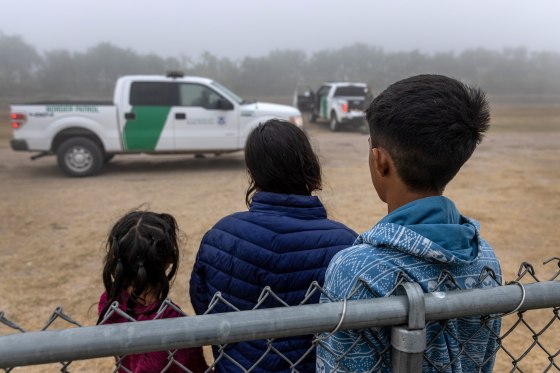The Trump administration on friday rescinded a stop-work order affecting federally funded legal services for unaccompanied migrant children.
The Acacia Center for Justice, a nonprofit that has a federal contract to provide legal aid to unaccompanied migrant children, said in a statement to NBC News on friday afternoon that it received notice that “it can immediately resume work providing representation and legal access services to unaccompanied children.”
“We welcome the news that the stop-work order on Acacia’s Unaccompanied Children Program has been lifted,” Shaina Aber, executive director of the Acacia Center for Justice, said in the statement. “We will continue working alongside the Department of Health and Human Services to ensure that these critical services upholding the basic due process rights of vulnerable children are fully restored and our partners in the legal field — legal lifelines safeguarding the rights and well-being of children seeking safety — can resume their work without future disruption or delay.”
The Department of the Interior sent a letter on friday addressed to the center saying it may “resume all activities” related to its contract for providing legal aid for unaccompanied minors, according to a copy of the letter obtained by NBC News.
On Tuesday, the Interior Department had sent a stop-work order to the center, cutting off funding for “all activities” under Acacia’s federal contract to provide legal services for unaccompanied migrants younger than 18, according to the text of that letter obtained by NBC News earlier this week. The letter directed the center to “cease all services and the ordering of supplies” and to notify subcontractors that a stop-work order had been issued.
“Children who arrive in the U.S. unaccompanied by parents or legal guardians often have often survived targeted violence, abuse, persecution, or trafficking,” Aber said in friday's statement. “It is unconscionable to think that they should be forced to represent themselves in immigration court against a trained government attorney in an adversarial hearing before a judge, without even a child-friendly orientation or understanding of their legal options.”
The center works with a network of organizations across the country to provide legal assistance to immigrants. It has a contract with the Office of Refugee Resettlement to provide legal assistance to nearly 26,000 children who crossed the border without their parents.
Under U.S. law, immigrants are not guaranteed a right to free legal representation, unlike U.S. citizens. But federal funds have allowed nonprofit groups to provide lawyers for children, some of whom are too young to speak and are making their way through the immigration system without parents or guardians.
The Department of Health and Human Services did not immediately respond to request for comment. The Department of Interior declined to comment.
“The Trump Administration’s decision to restore this vital funding ensures the continuation of vital protection of vulnerable unaccompanied children, some as young as toddlers, against trafficking, exploitation, and other abuses,” Wendy Young, the president of the Kids in Need of Defense, which provides pro bono legal representation for unaccompanied children, said in a statement to NBC News.
“When the stop work order came in, we were terrified of what that meant for our clients. Across the country that’s 26,000 kids who could lose attorneys,” Michael Lukens, the executive director of the Amica Center for Immigrant Rights, told NBC News. The center provides free legal services to adults and children in government custody who are facing deportation. Some of the children the center works with are toddlers and younger, Lukens said.
Lukens described attorneys meeting children who had just arrived at government shelters and attempting to explain to them a process that would have life-changing implications.
He said attorneys used pictures, photos and drawings to tell the children what would happen.
“We talk about how scary it will be, and then they will have to go to a court in front of an immigration judge who is up on a bench wearing a robe, and it’s a very terrifying moment where they’re sitting at a table with their attorney, looking at this person speaking a language that they likely do not speak and talking about their future,” Lukens said.
“It’s near impossible for anybody to win an immigration court without an attorney, let alone a child,” he added.
After Tuesday's stop-work order, Lukens' organization scrambled to fundraise and “were committed to still doing the work as long as we could,” he said.
He said the organization had not told its clients about the order earlier this week as many of them were in the United States after facing serious trauma in their home countries.
“These kids have been through so much, and the idea of telling an unaccompanied child that they may lose their advocate is horrific,” Lukens said. “So to avoid further trauma, we did not talk to our clients about this, but we continued to do the work.”
“In the long term, if the funding didn’t get unfrozen or if it gets attacked again, you will see a cataclysmic collapse of nonprofit legal aid for immigrant children,” he said. “This is the number one funding stream across the country.”

